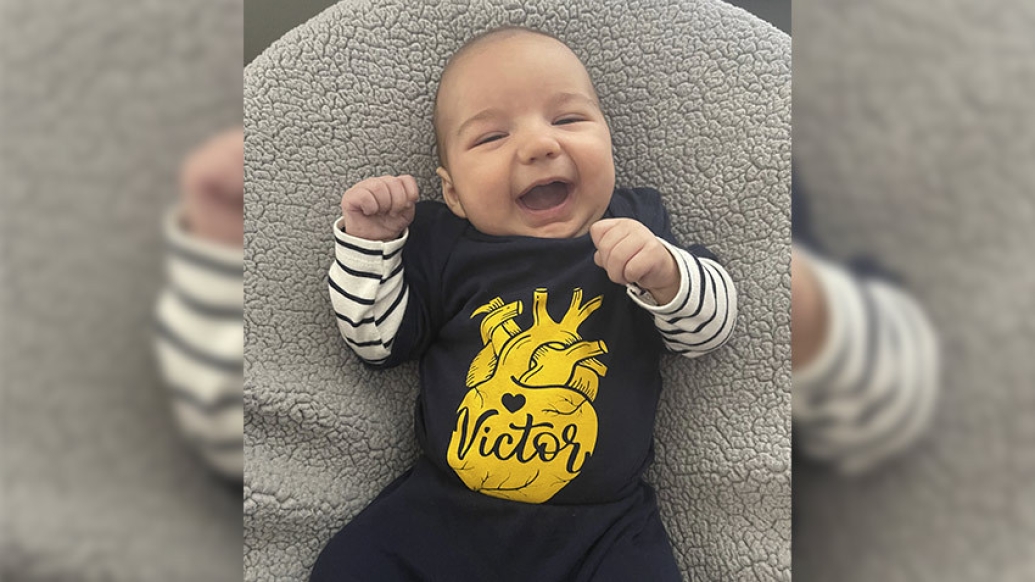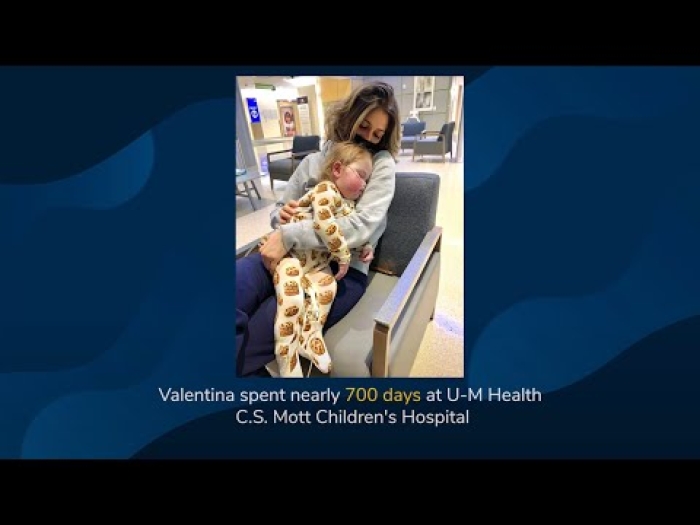Baby Gus appeared healthy, but further investigation revealed a congenital heart defect.
8:16 AM
Author |

For the Hinckas, what started as a non-urgent doctor visit ended with their newborn son undergoing open heart surgery 24 hours later.
At birth, Augustus "Gus" Hincka showed signs of a heart murmur, but his family went home from their local hospital believing the cause wasn't concerning enough to need treatment.
Still, Gus' scans were sent to Scott Maurer, M.D., pediatric cardiologist at Michigan Medicine C.S. Mott Children's Hospital. When he analyzed them, something didn't seem right. He asked the Hinckas, of Rogers City, to make a follow up visit to his clinic in Petoskey earlier than planned.
And there, after examining two-week-old Gus in person and reviewing new images, Maurer discovered that the seemingly healthy baby's heart had already started failing from a critical congenital heart defect.
Instead of going home from their appointment, Gus' parents Jackie and Aaron Hincka made the four-hour drive to Mott in Ann Arbor for next-day surgery.
"He looked and acted healthy to everyone around him, but under the surface, there were subtle signs of heart failure," says Maurer, who lives in Northern Michigan and additionally has clinics in Traverse City and Alpena.
"There were enough red flags to indicate there was more to the story and make us dig deeper. It took aggressive, attentive and diligent steps to detect what was wrong. Delays in treatment could've led to him getting very sick and may have been life-threatening."
An initial interpretation by local providers after Gus was born in January 2020 indicated he had an irregularity in the heart that didn't require immediate interventions.
SEE ALSO: 13-Year-Old Celebrates One Year with a New Heart
But further reviews by Maurer led to a diagnosis of severe coarctation of the aorta (COA.) This meant part of the aorta, which carries oxygen-rich blood to the body, was too narrow – and Gus's left ventricle was already showing signs of heart dysfunction and failure as it struggled against that narrow obstruction.
"When he was born everyone seemed confident that the cause of the heart murmur wouldn't need intervention. We weren't that concerned and didn't even tell our families about it," says Jackie, a nurse. "We were following up with cardiology just to be safe.
"I was just stunned. You go in there just thinking it's going to be a pretty routine thing – and then learn your child needs a very serious surgery on a critical organ. Without surgery, everything may have continued seeming normal to us while his heart function declined."
He looked and acted healthy to everyone around him, but under the surface, there were subtle signs of heart failure.Scott Maurer, M.D.
The day after seeing Maurer in January, Gus underwent a successful repair procedure by pediatric heart surgeon Peter Sassalos, M.D. of the Mott Congenital Heart Center.
His recovery has been smooth and uneventful, he is feeding strongly and is continuing to progress, steadily gaining weight. His siblings Noraa, 8, Maximus "Max", 6 and Samson, 3, have also been enjoying time and snuggles with their new baby brother.
"He has just been a happy growing baby. You'd never know he recently had this huge life-saving procedure," Jackie says.
Maurer says Gus will continue to need to be monitored for secondary effects from the heart defect and may possibly need re-intervention later in life. But he expects him to grow up to be as active as any of his peers.
"Had he not had early treatment, it may have altered his quality of life. But nothing is going to catch us by surprise at this point," Maurer says. "I'm optimistic that Gus will be running around with other kids at the playground and playing sports if he wants to."
Jackie says the family was happy to get their care at Mott, which is where their son Max was also treated for cleft lip and continues to receive care from the craniofacial anomalies team.
"We just truly felt taken care of and that these teams personally cared about us and our child," Jackie says.
She's also thankful that they had access to specialized heart care close to their rural Northern Michigan community.
"It's amazing to have a clinic offering this level of experience and services close by," she says. "It takes the stress of travel out of an already stressful situation."

Explore a variety of healthcare news & stories by visiting the Health Lab home page for more articles.

Department of Communication at Michigan Medicine
Want top health & research news weekly? Sign up for Health Lab’s newsletters today!





